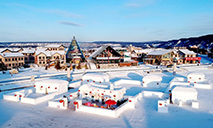A true champion behind China's drive for building a sporting powerhouse
-- Chinese President Xi Jinping declares the country's 14th National Games open in Xi'an, northwest China.
-- A firm promoter of national fitness and a keen sports fan himself, Xi has advocated sports as an important means for improving people's health, meeting people's aspirations for a better life and facilitating all-around human development.
-- International Olympic Committee (IOC) President Thomas Bach describes Xi as "a true champion" and "the true Olympic champion for the youth" because of his clear vision about the important role of sports in society and the importance of sports for education for the young people.
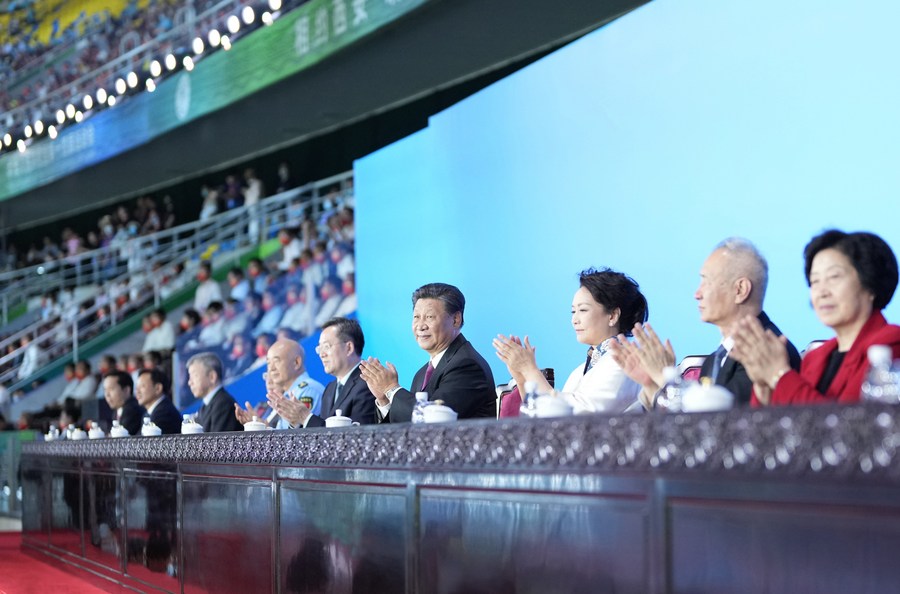
Chinese President Xi Jinping, also General Secretary of the Communist Party of China Central Committee and Chairman of the Central Military Commission, attends the opening ceremony of the 14th National Games and declares the Games open in Xi'an, capital city of Shaanxi Province, Sept. 15, 2021. (Xinhua/Li Xueren)
XI'AN, Sept. 15 (Xinhua) -- Chinese President Xi Jinping declared the country's 14th National Games open in Xi'an, the capital city of northwest China's Shaanxi Province, on Wednesday evening.
This marked the third time that Xi has attended the opening ceremony of the country's premier multi-sport event since 2013.
A keen sports fan himself, Xi has on many occasions expounded on his profound understanding of sports and taken the lead in China's efforts to turn the country into a sports powerhouse, a goal he described as part of the Chinese dream of national rejuvenation.
"President Xi is a true champion and I want to give him a set of medals because he has a clear vision about the important role of sports in society, and the importance of sports for education for the young people. So in this respect, he is the true Olympic champion for the youth," International Olympic Committee (IOC) President Thomas Bach told reporters when Xi paid a visit to the IOC headquarters in Lausanne, Switzerland, in 2017.
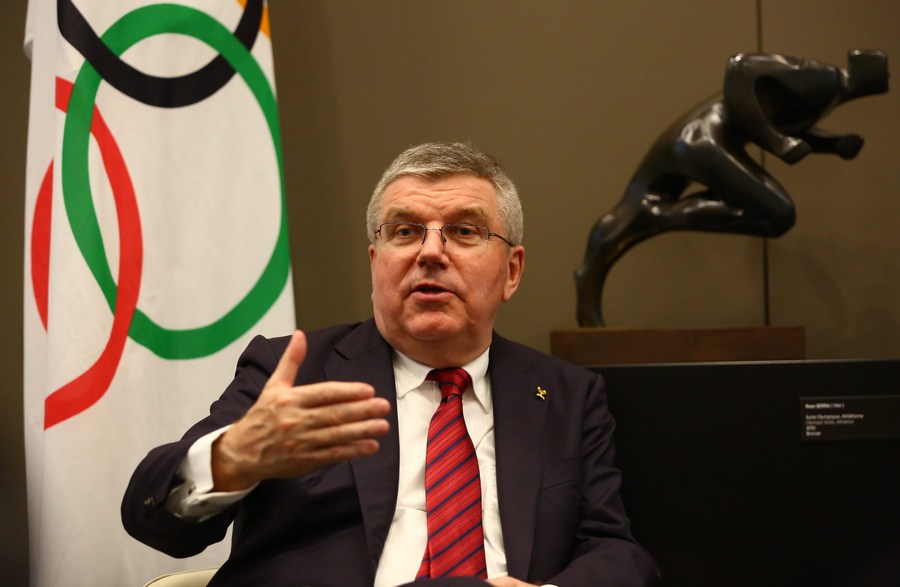
Thomas Bach, president of the International Olympic Committee (IOC), speaks to Xinhua in an interview in Lausanne, Switzerland, Jan. 18, 2017. (Xinhua/Gong Bing)
BUILDING A SPORTS POWERHOUSE
As a firm promoter of national fitness, Xi has advocated sports as an important means for improving people's health, meeting people's aspirations for a better life and facilitating all-around human development.
Since the 18th CPC National Congress in 2012, Chinese people's enthusiasm for sporting exercises has been on a rise, along with the elevation of the Fitness-for-All Five-Year Plans into a national strategy.
These measures in promoting mass sports are excellent manifestation toward Xi's remarks -- "The foundation of building a sporting powerhouse lies in mass sports."
Outside a public fitness sports center located in Yan'an, a former revolutionary base of the Communist Party of China (CPC), Wu Yan is leading a team to perform yangko, a folk-style Chinese dance.
At the end of August, two teams guided by Wu won top and third prizes in the square dance event in mass program of the 14th National Games, which is billed as China's "mini Olympics".
"During the revolutionary period, the yangko and waist drum were promoted to the whole country from Yan'an. Now fitness waist drum and yangko created by us have brought people the health," said Wu.
As reflected in the 14th edition's theme "Games for all, together in mind and action", the National Games not only witnesses elite athletes contending for glory, but also sets a stage for ordinary people to showcase their athletic skills and enthusiasm.
In a bold move to reform the National Games, the 13th edition in Tianjin four years ago opened its doors to amateur competitors, as some 8,000 non-professional competitors from all over China, and even from abroad, got a chance to shine on the national sporting stage. And a total of 185 events across 19 sports in mass program are included for the 14th National Games.
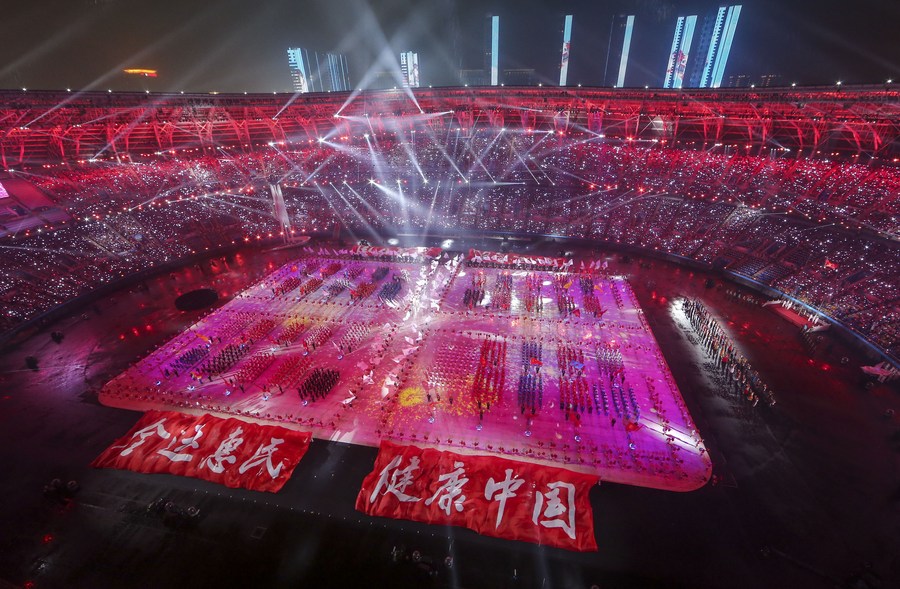
Photo taken on Aug. 27, 2017 shows the opening ceremony of China's 13th National Games in Tianjin Municipality. (Xinhua/Xu Zijian)
UPHOLDING OLYMPIC SPIRIT
At the Tokyo Olympics, China won 38 golds, 32 silvers and 18 bronzes, equalling its haul of gold medals at London 2012 for the best performance at an overseas Olympics.
Despite missing out on a medal in Tokyo, 32-year-old sprinter Su Bingtian has been hailed as a hero by many Chinese sports fans for bettering the men's 100m Asian record to 9.83 seconds.
"There is room for improvement for me," Su said of his breakthrough one month ago. "Many say that is the limit for the Asian, but I don't think so."
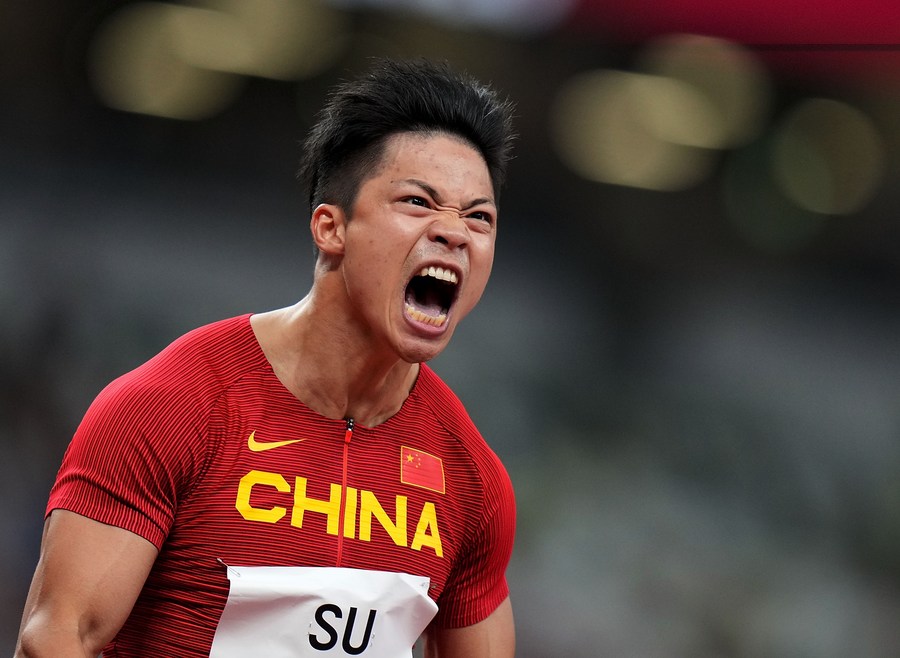
Su Bingtian of China celebrates his win in the men's 100m semifinal at Tokyo 2020 Olympic Games, Aug. 1, 2021. (Xinhua/Lui Siu Wai)
Su is just a vivid manifestation of the Olympic Spirit which President Xi has called for Chinese athletes to uphold.
When meeting with the Chinese delegation for the Sochi Olympic Winter Games in 2014, Xi noted that good results were not reflected merely in the number of medals, but more in the Olympic Spirit they demonstrate by constantly improving and excelling themselves.
In an open letter addressed to the postgraduate class of Olympic and world champions at the Beijing Sport University, Xi urged them to make greater contributions to China's sporting culture and society.
"I hope you maintain your efforts, continue to build China into a leading sporting nation and bring more positive energy to Chinese society," the Chinese President said.
More than 200 doping control officers are expected conduct a record number of doping tests during the ongoing 14th National Games. It is in line with Xi's wish that athletes go for "ethic, friendly and clean" gold medals.
Xi once said the fight against doping in sports should be resolutely pushed forward, and vowed "zero tolerance" for doping in sports.
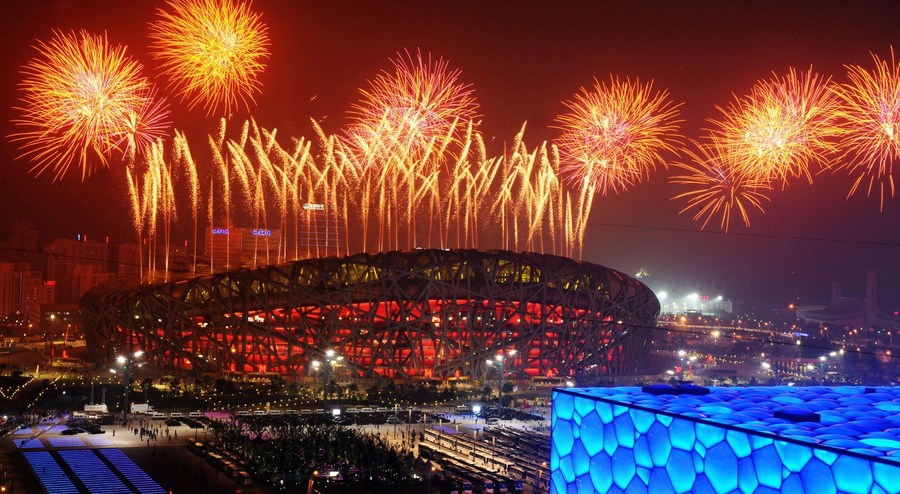
Photo taken on Aug. 8, 2008 shows the fireworks displayed during the opening ceremony of the Beijing Olympic Games held in the National Stadium, also known as the Bird's Nest, in Beijing, capital of China. (Xinhua/Xu Jiajun)
"SIMPLE, SAFE AND SPLENDID" BEIJING 2022
Beijing is set to become the first city to host both the Summer and Winter Games when the 2022 Winter Olympics open in the Chinese capital next February.
From bidding to preparing for the Winter Olympics, President Xi has been playing a leading role.
Hours before the IOC members cast their votes on the host city for the 2022 Winter Olympics on July 31, 2015, Xi delivered his speech on television to guarantee a "fantastic, extraordinary and excellent Olympic Winter Games." Following his inspection tours of Beijing and Hebei in January this year, Xi called for advancing preparation work for the Beijing 2022 Winter Olympics against difficulties and "with greater perfection."
Before China was awarded the 2022 Winter Games, engaging over 300 million Chinese in winter sports has already been in Xi's mind.
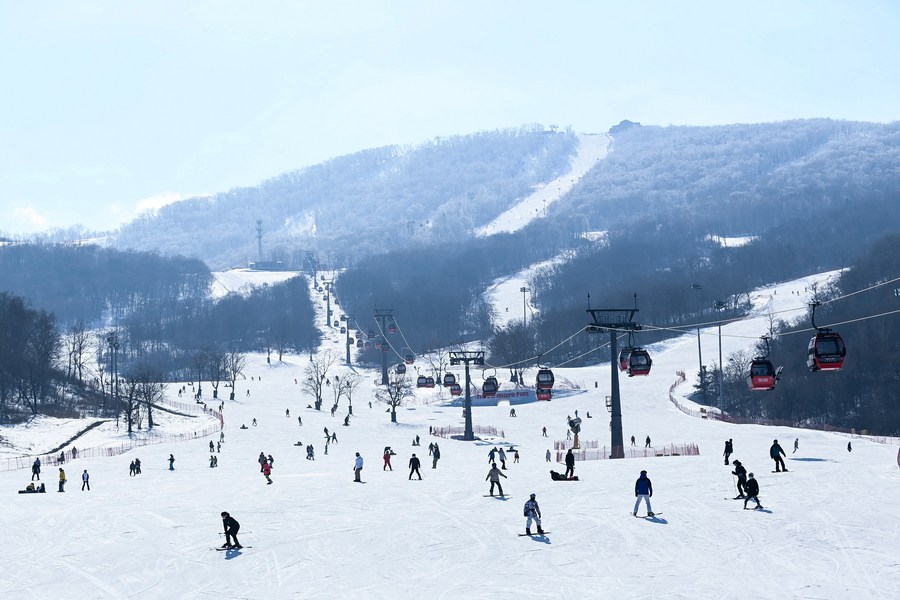
People ski at a ski resort in Jilin City, northeast China's Jilin Province, Feb. 15, 2021. (Xinhua/Yan Linyun)
Staff in Beijing's Badaling ski resort had busy days during the Spring Festival this year, as over 10,000 people took to skis during the span. "This reflects the implementation of engaging more than 300 million people to winter sports," said Wu Bin, general manager of the ski resort.
According to a Legacy Report released by the BOCOG on June 23 outlining the pre-Games legacies achieved by Beijing 2022, a record 224 million Chinese people participated in ski and skating activities during the 2018/19 winter season.
Just as China held the 2008 Summer Olympics to push its economic and social development, Xi also intends to host the 2022 Games as a catalyst to promote sustainable economic growth not only in Beijing, but in areas surrounding the capital.
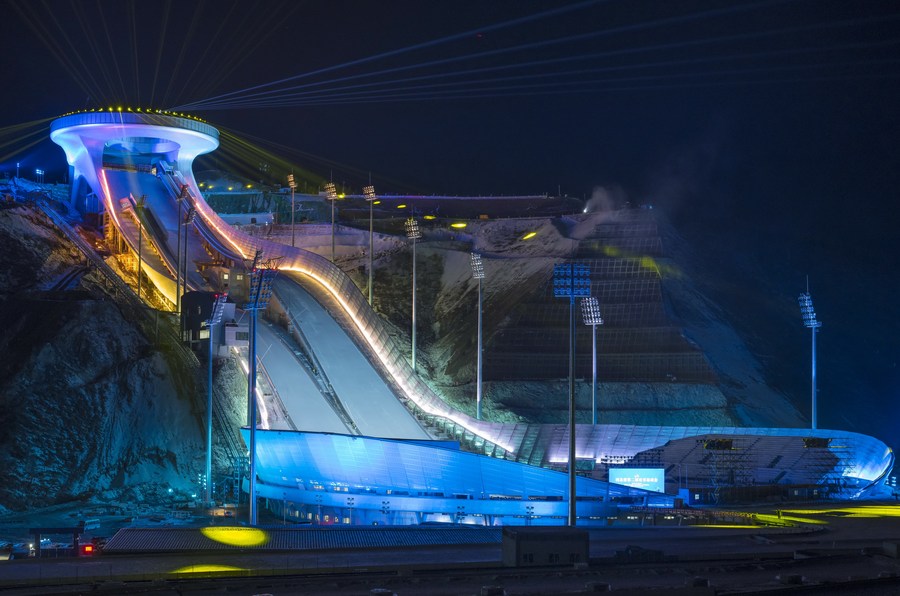
Photo taken on Dec. 19, 2020 shows the National Ski Jumping Center in Chongli District of Zhangjiakou City, north China's Hebei Province. (Xinhua)
In 2015, 16.8 percent of the 100,000 residents in Chongli, Hebei Province were classified as living below China's national poverty line, with most locals leaving to work in Beijing and other major cities.
Nowadays this mountainous town, where most of the snow events will be staged during the 2022 Winter Olympics, has seen a boom in skiing tourism in recent years. Thanks to the Beijing-Zhangjiakou high-speed rail link which went into operation at the end of 2019, a four-hour drive has been cut to a 50-minute train ride to travel from Beijing to Chongli for skiing.
In May 2019, Chongli was officially lifted out of poverty. Nearly 30,000 of its 126,000 population are employed by ski resorts or related companies and organizations.
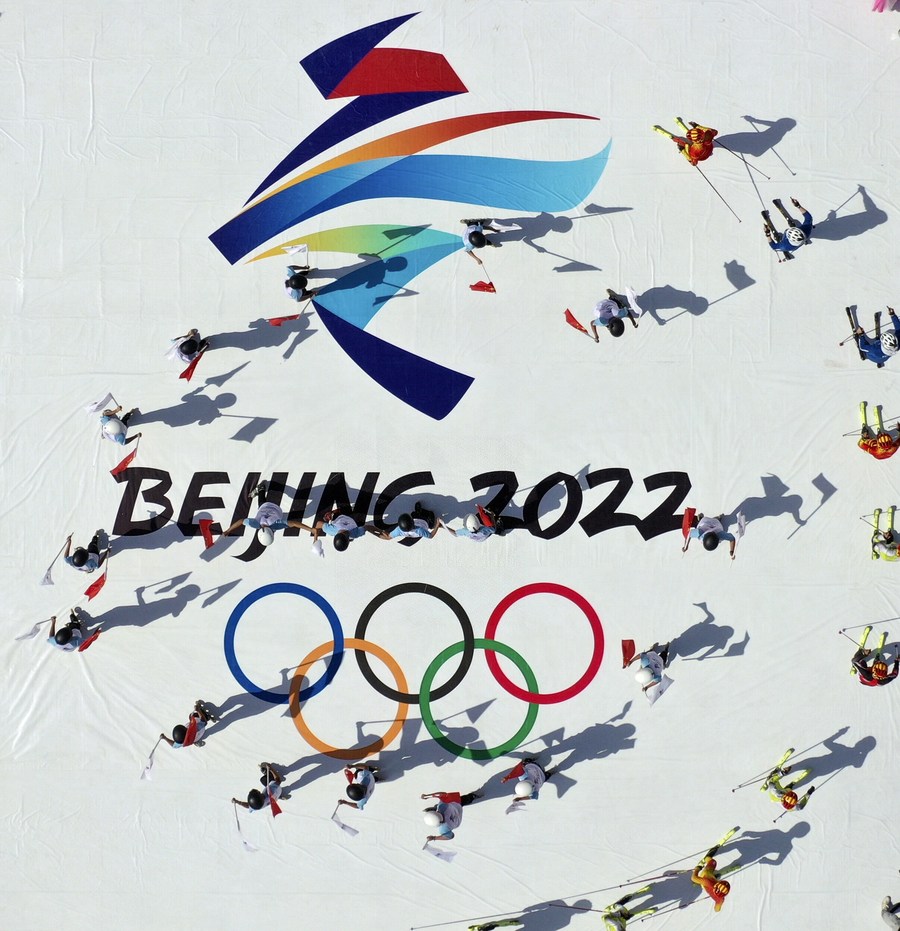
Aerial photo taken on May 11, 2019 shows the performance during the 1,000-day countdown celebrations of the Beijing 2022 Olympic Winter Games in Chongli of Zhangjiakou City, north China's Hebei Province. (Xinhua/Xing Guangli)
"The Winter Olympics can help raise people's awareness of skiing," said Wang Xinhua, a chef at Thaiwoo Ski Resort in Chongli.
"With these 300 million people engaging in winter sports, we can clearly say the history of winter sports will be one before Beijing 2022 and one after the Winter Games in Beijing," commented Bach.
Photos
Related Stories
- Chinese President Xi Jinping declares 14th National Games open
- What to watch at 14th National Games
- Olympic rowing winning team fights in China's National Games
- Xi'an vows 'zero COVID-19' National Games, to create standard for Beijing Winter Olympics
- Olympic champions Yang Qian/Yang Haoran win gold in 10m air rifle mixed team at National Games
Copyright © 2021 People's Daily Online. All Rights Reserved.







